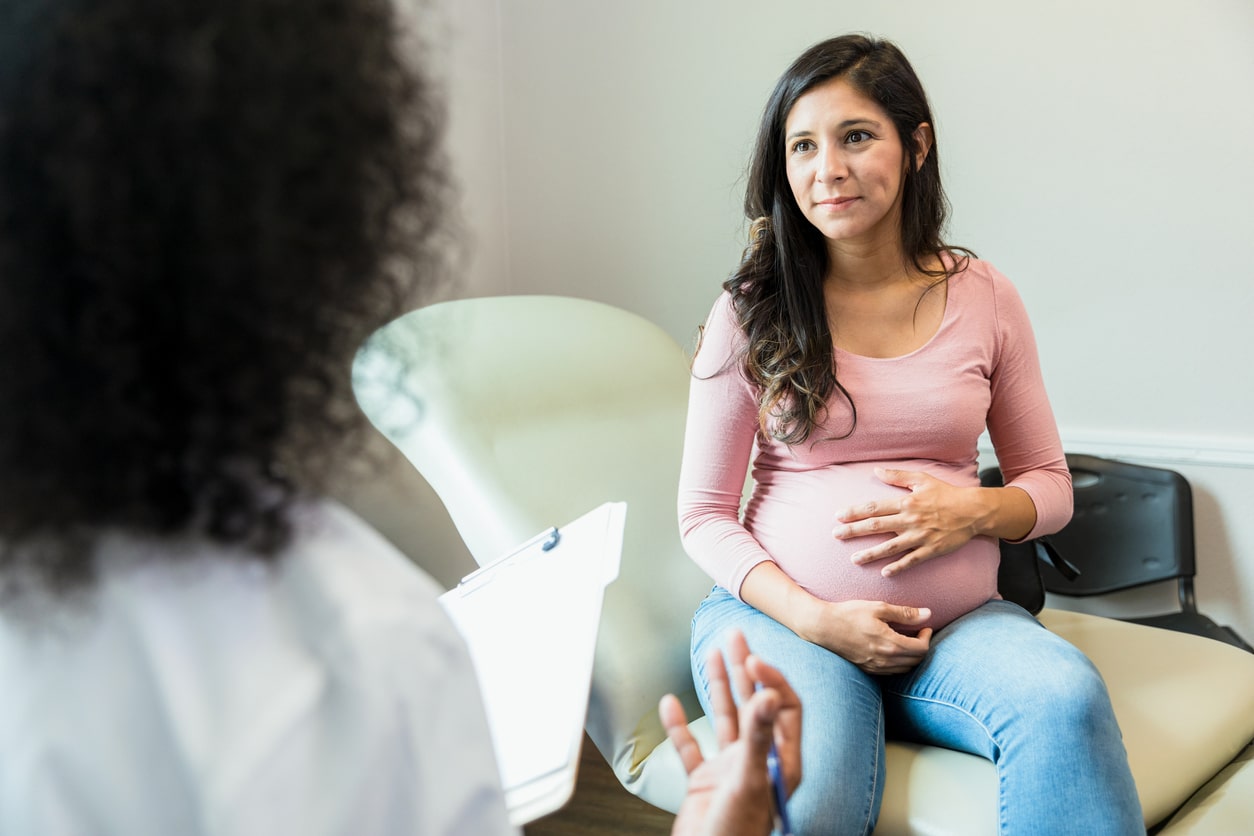Single Moms by Choice: Weighing the Pros and Cons

If you’ve always wanted kids, but don’t have or don’t want a partner, what are your options? Today, more people are exploring the path of single parenthood.
Parenting doesn’t look the same in every family. There are two-parent households, blended families, one-parent households, and families where kids are raised by grandparents, aunts and uncles, or godparents.
Single women now have more access to, IVF, IUI, and other assistive reproductive techniques that enable them to have a child without a male partner. However, the choice to intentionally become a single mom or a single dad is still viewed with certain societal hurdles and social stigmas.
Related: How to Cope with Loneliness as a Single Mom
What Does Life Look Like for Single Moms by Choice?
If you think single parenting might be right for you, it's important to weigh the positive and negative emotional, financial, and social impact of being a single mom. The decision to have a baby by yourself is purely personal. One of the hardest parts of single parenting by choice is taking the leap.
So, if you’re not sure whether creating a family without a partner is the best choice for you right now, take your time, weigh the options, get support from your BFF or family, and talk to other moms who have been in or are in your shoes.
Can You Be A Single Mother By Choice?
“Yes!” The Single Mom by Choice (SMC) movement started growing over 30 years ago and is now more popular than ever in the U.S. There isn’t one universal reason to choose this type of family structure.
Some women hear the tick tick tick of their supposed biological clock and want to start a family before it’s too late. While there are many factors that affect a woman’s fertility, age is a primary issue for people who are nearing or even in the perimenopause stage of life.
Single Motherhood Statistics in the U.S.
According to the U.S. Centers for Disease Control and Prevention (CDC), in 2021 there were more than 1.4 million live births to unmarried women. This was 40 percent of the total number of births for the year. Of course, these women aren’t all single mothers by choice (or SMC). But when it comes to choosing single motherhood, you (should you choose to pursue this road to parenting) aren’t alone.

Single Motherhood by Choice Statistics in the U.S.
Cryos International, a leading sperm and egg bank, notes that 54 percent of the company’s sperm donor recipients are single mothers-to-be. While adult women of any age can choose to become single parents, a whopping 78 percent of women who go the solo sperm bank route are between the ages of 36 and 45. But this doesn’t mean you need to wait until you hit your mid-30s, or even your mid-40’s, to start trying to conceive.
Why Do People Choose To Become Single Moms?
There’s no one reason why someone may choose to become a single parent. Factors such as age, fertility issues, divorce and separation, financial stability/financial instability, and personal readiness are all reasons why someone may choose single parenthood.
Women Delaying Pregnancy for Economic and Professional Stability
Choosing to become a mother is one of the most significant choices a woman will make in her life, as having a child directly impacts her health, personal relationships, career progression, and future financial prospects for the rest of her life.
Studies show that pregnancy and motherhood negatively impact women’s ability to get hired, get promoted, and reach their full earning potential. Leaving the labor force to have kids or taking maternity leave can all “cost” women in their careers.
Therefore, more women are waiting until later in life to start families in order to ensure they are more professionally and financially stable. Consequently, dedicating more time to education and professional development can leave less time for dating or pursuing a romantic life partner.
If a woman’s financial and professional timeline does not align with her family prospects, the idea of becoming a single mom by choice may be appealing.
However, even though waiting to have enough money to support a child may feel like the right choice, trying to have a child later in life can come with its own complications.
Older Women Have Lower Fertility Rates
As women become older, the number and quality of their eggs decline. This can make it more challenging for a woman to conceive a baby past a certain age.
Statistics from the CDC show that in 2021 the birth rate for women ages 25 through 29 was 93 percent. This rate jumps to over 97 percent for women in their early 30’s, ages 30 to 34. But the rate falls to just under 54 percent for women ages 35 to 39 and to 12 percent for women ages 40 to 44. If you’re wondering what the CDC’s stats say about women 45-plus—they don’t.
While it’s not impossible for a woman 45 or over to get pregnant naturally, it’s far less likely than it is for a younger future mom-to-be. And if you’re looking to see some stats on natural pregnancies among those in peri or on the verge of it, you won’t find much data. The majority of the older-than-45 pregnancy statistics focus on assisted reproductive technology (ART).
The CDC’s National ART Summary’s oldest age range is 42 and up. The success rate of ART in this group was 10.1 percent in 2020. This is compared to just over nine percent success rate in women ages 41 and 42, 20 percent in women ages 38 through 40, 23.3 percent in women ages 25 through 37, and 73.2 percent in women 35 and under.
Geriatric Pregnancies and Increased Pregnancy Complications and Birth Risks

A woman may also choose to be an SMC to reduce the odds of their baby having certain birth risks or birth defects associated with older or geriatric pregnancies.
The American College of Obstetrics & Gynecology defines a geriatric pregnancy as a pregnancy that occurs in a woman over the age of 35. Geriatric pregnancies are typically more risky for both mother and baby than pregnancies at a younger age.
Risks of pregnancy at “advanced maternal age” include increased risk of Down Syndrome and miscarriage. The risk of giving birth to a child with Down Syndrome grows from 1 in 353 at age 35 to 1 in 85 by age 40.
Similarly, at 22, a person's risk of miscarrying is only 9%. However, at the age of 30, the risk has doubled to 18%. For the pregnant person, older pregnancies also increase the risk of experiencing dangerous pregnancy complications like preeclampsia and gestational diabetes.
Lack of Romantic Prospects' or Interest in Romantic Partnership
Even though age is a factor for many women who make this decision, you may have a different reason for wanting a solo pregnancy. Many people want to have kids but struggle to find the right partner to share their life with. Other people choose to be single parents because they simply aren’t interested in pursuing marriage or finding a life partner.
What to Consider Before Becoming a Single Mom by Choice
How do you know if creating a family without a spouse or partner is the right choice? Again, this decision is highly personal. There is no standard rubric that can help all would-be single parents to choose this path. Instead, you will need to think about:
-
Why You Want to Become a Parent
Do you want to be a parent to love and support a child or to fill another void in your life? You should never choose to have a child to fix other problems in your personal or professional life because it won’t work. Think long and hard about whether you want this baby because you want to be a parent or if you just want to feel less lonely.
-
Your Financial Situation
Speaking of being financially stable to support a child, this issue is a major concern for many moms-to-be. Not only won’t you have the emotional support of a partner, you won’t have the financial support either. Single motherhood means you aren’t just the primary breadwinner—you’re the only breadwinner. Before you take the next steps, review your finances.
Even though you may feel confident with the dollar amount that is currently in your bank account, think about what would happen if you suddenly lost your job or had an unexpected major expense.
Along with everything you need for yourself, add in the cost of baby gear, toys, summer camps, pre-school, daycare, college, and everything else your kiddo will need along the way.
-
Your Fertility Treatment Options
A fertility specialist can help you to make a choice based on your medical needs and preferences. The most common options include intrauterine insemination and in vitro fertilization. Intrauterine insemination (IUI) requires the doctor to place the sperm into the uterus.
According to the Cleveland Clinic, the conception rate of IUI when fertility drugs are used is about 20 percent. This is similar to the rate for natural conception. In vitro fertilization (or IVF) involves fertilizing the egg with the sperm in a lab.
A doctor will then place the fertilized embryo into your uterus. Penn Medicine notes that there is over a 21 percent chance of having a full-term single live birth per each IVF cycle. But factors such as age and egg quality do affect the chances.
-
Your Support System
A spouse or significant other is not the only source of support. Even though you are making the choice to have a baby on your own, you aren’t literally on your own.
Single motherhood feels much easier if you have family and friends nearby to drive you to your prenatal appointments, take care of you as you recover in postpartum, or serve as babysitters if you get sick or need to take a trip away from home.
Cryos International found that nearly half of the women choosing to have a baby solo feel that a good support system is essential. Do you have people nearby who you can rely on being there for you when you need them?
Keep in mind, your support system doesn’t have to look like someone else’s. Your parents, siblings, other relatives, or BFFs could become the support you need during pregnancy and after you give birth.
-
Your Other Responsibilities
As a single parent, you’ll need to learn to balance your work and parenting responsibilities alongside other day-to-day responsibilities like chores, grocery shopping, caring for your parents or other relatives, managing doctors' appointments, etc. all by yourself.
Are you able to devote enough time to all of your different commitments without someone picking up some of the load?
-
Your Future as a Single Parent in 10+ Years
Parenting is a job for life. After you make it through the first few months of sleepless nights and near-constant diaper changes, you’ll move on to the tantruming toddler years, kindergarten readiness, school, the awkward tween years, parenting a teen (and dealing with super-serious subjects such as alcohol and drug use, smoking, sex, and your child’s future career), and more.
Look past having a baby and think about parenting your child in a year, five years, 10 years, or when they hit young adulthood.
Benefits of Single Motherhood By Choice
Some of the benefits of becoming a SMC are obvious. First and foremost, you actually get to be a mom. Whether parenthood was always a goal or it’s gained a new sense of importance in your life, getting pregnant soon and without waiting for a partner is the next step.
Even though single parenting isn’t exactly easy, there are benefits for SMCs. These include:
-
Control Over Your Parenting Decisions
You won’t need to consult with, argue with, or worry about anyone else’s opinions when it comes to decision-making for your child. From when to start daycare to the first time you take your kiddo on an impromptu getaway, you’ll hold all the cards.
-
Special Single Parent/Child Bonds

You’re a team of two! As not just the primary, but the only parent, you’ll have the unique opportunity to form a strong bond with your child. This type of family dynamic can help to foster a sense of closeness that you can enjoy in the early years and down the road.
-
Less Stress About Your Fertility and Future Goals
Do you crave independence? Whether you’re already extremely independent or you want to push yourself into this role, SMC can help you take action on your own.
Are you constantly stressed over your ability to conceive and carry a child as you age? Yes, you may need fertility treatments to have a baby. But becoming a single mom by choice puts the process in your hands and stops the countdown.
Negatives of Single Motherhood By Choice
This major life choice isn’t for everyone. If this is your first child you may wonder what it’s like to be a parent or if you have the right skills to help your future child through every milestone, heartache, happy moment, and anything else that will come their way.
The magnitude of the choice to become a single parent makes it necessary to review the negatives.
While you may only want to focus on the positives of single parenthood, some of the negative sides of being a single mom by choice may include:
1. Financial Strain
As of 2017, the U.S. Department of Agriculture (USDA) reports that the cost of raising a child from birth through age 17 is on average $233,610. This includes everything from housing and food to childcare and other educational expenses.
2. Lack of Support
Again, a support system is crucial for any SMC. Without this system, you may feel scared, alone, or sad during the hardest parts of parenting.
The good news is, that if you don’t have a system in place, you can start searching for one. From family members to friends you meet at a parent support group to share information with, you can create your own caring community.
3. Difficult Fertility Treatments
IUI and IVF are treatments that many couples need when the man, the woman, or both can’t conceive naturally. But you may have no problem getting pregnant. When you’re TTC solo, you will still need help to have a baby—whether your fertility is an issue or not.
This could involve potentially pricey options, such as egg donation, donor sperm, and IUI/IVF procedures. While some states do require insurance companies to pay for fertility treatments, many do not.
According to the Kaiser Family Foundation, nearly 15 years ago a single IVF cycle could cost as much as $12,500 in out-of-pocket expenses. Add in inflation, and you’re likely to pay much more now.
Deciding if Being a Single Parent by Choice is Right For You
Yes, there are drawbacks to SMC-ing. There are also plenty of pros. Before you make a decision, talk to other parents—single moms by choice, single parents not by choice, and two-parent families. Along with this type of candid conversation, discuss the options with your OBGYN or a fertility specialist.
Talking to the doctor can help you to better understand where your fertility is right now, where it is headed, and what the best strategy is for your individual needs.
Do you want to learn more about fertility treatments? Check out our guide: IVF and Fertility Treatment Options: Risks, Costs, Success Rates.

